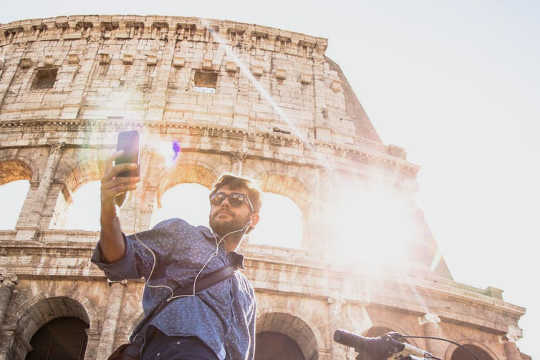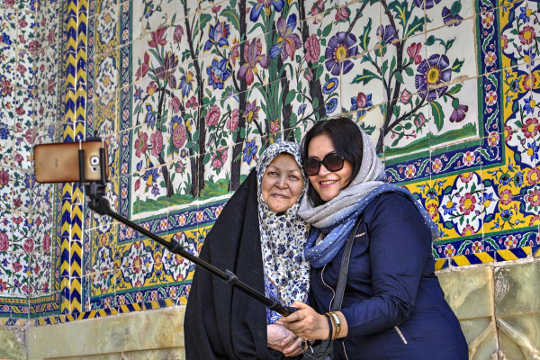 Shutterstock
Shutterstock
I recently visited the Hermitage in St Petersburg, Russia – one of the best art museums in the world. I was expecting to serenely experience its masterpieces, but my view was blocked by a wall of smart phones taking pictures of the paintings. And where I could find a bit of empty space, there were people taking selfies to create lasting memories of their visit.
For many people, taking hundreds, if not thousands, of pictures is now a crucial part of going on holiday – documenting every last detail and posting it on social media. But how does that affect our actual memories of the past – and how we view ourselves? As an expert on memory, I was curious.
Unfortunately, psychological research on the topic is so far scant. But we do know a few things. We use smart phones and new technologies as memory repositories. This is nothing new – humans have always used external devices as an aid when acquiring knowledge and remembering.
Writing certainly serves this function. Historical records are collective external memories. Testimonies of migrations, settlement or battles help entire nations trace a lineage, a past and an identity. In the life of an individual, written diaries serve a similar function.
Memory effects
Nowadays we tend to commit very little to memory – we entrust a huge amount to the cloud. Not only is it almost unheard of to recite poems, even the most personal events are generally recorded on our cellphones. Rather than remembering what we ate at someone’s wedding, we scroll back to look at all the images we took of the food.
This has serious consequences. Taking photos of an event rather than being immersed in it has been shown to lead to poorer recall of the actual event – we get distracted in the process.
Relying on photos to remember has a similar effect. Memory needs to be exercised on a regular basis in order to function well. There are many studies documenting the importance of memory retrieval practice – for example in university students. Memory is and will remain essential for learning. There is indeed some evidence showing that committing almost all knowledge and memories to the cloud might hinder the ability to remember.
 Smile. Just dance/Shutterstock
Smile. Just dance/Shutterstock
However, there is a silver lining. Even if some studies claim that all this makes us more stupid, what happens is actually shifting skills from purely being able to remember to being able to manage the way we remember more efficiently. This is called metacognition, and it is an overarching skill that is also essential for students – for example when planning what and how to study. There is also substantial and reliable evidence that external memories, selfies included, can help individuals with memory impairments.
But while photos can in some instances help people to remember, the quality of the memories may be limited. We may remember what something looked like more clearly, but this could be at the expense of other types of information. One study showed that while photos could help people remember what they saw during some event, they reduced their memory of what was said.
Identity distortions?
There are some rather profound risks when it comes to personal memory. Our identity is a product of our life experiences, which can be easily accessed through our memories of the past. So, does constant photographic documentation of life experiences alter how we see ourselves? There is no substantial empirical evidence on this yet, but I would speculate that it does.
Too many images are likely to make us remember the past in a fixed way – blocking other memories. While it is not uncommon for early childhood memories to be based on photos rather than the actual events, these are not always true memories.
 Take a couple. Grigvovan/Shutterstock
Take a couple. Grigvovan/Shutterstock
Another issue is the fact that research has uncovered a lack of spontaneity in selfies and many other photos. They are planned, the poses are not natural and at times the image of the person is distorted. They also reflect a narcissistic tendency which shapes the face in unnatural mimics – artificial big smiles, sensual pouts, funny faces or offensive gestures.
Importantly, selfies and many other photos are also public displays of specific attitudes, intentions and stances. In other words, they do not really reflect who we are, they reflect what we want to show to others about ourselves at the moment. If we rely heavily on photos when remembering our past, we may create a distorted self identity based on the image we wanted to promote to others.
That said, our natural memory isn’t actually perfectly accurate. Research shows that we often create false memories about the past. We do this in order to maintain the identity that we want to have over time – and avoid conflicting narratives about who we are. So if you have always been rather soft and kind – but through some significant life experience decide you are tough – you may dig up memories of being aggressive in the past or even completely make them up.
Having multiple daily memory reports on the phone of how we were in the past might therefore render our memory less malleable and less adaptable to the changes brought about by life – making our identity more stable and fixed.
But this can create problems if our present identity becomes different from our fixed, past one. That is an uncomfortable experience and exactly what the “normal” functioning of memory is aimed to avoid – it is malleable so that we can have a non-contradictory narrative about ourselves. We want to think of ourselves as having a certain unchanging “core”. If we feel unable to change how we see ourselves over time, this could seriously affect our sense of agency and mental health.
So our obsession with taking photos may be causing both memory loss and uncomfortable identity discrepancies.
It is interesting to think about how technology changes the way we behave and function. As long as we are aware of the risks, we can probably mitigate harmful effects. The possibility that actually sends shivers to my spine is that we lose all those precious pictures because of some widespread malfunctioning of our smart phones.
So the next time you’re at a museum, do take a moment to look up and experience it all. Just in case those photos go missing.![]()
About The Author
Giuliana Mazzoni, Professor of Psychology, University of Hull
This article is republished from The Conversation under a Creative Commons license. Read the original article.
Related Books
at InnerSelf Market and Amazon
























